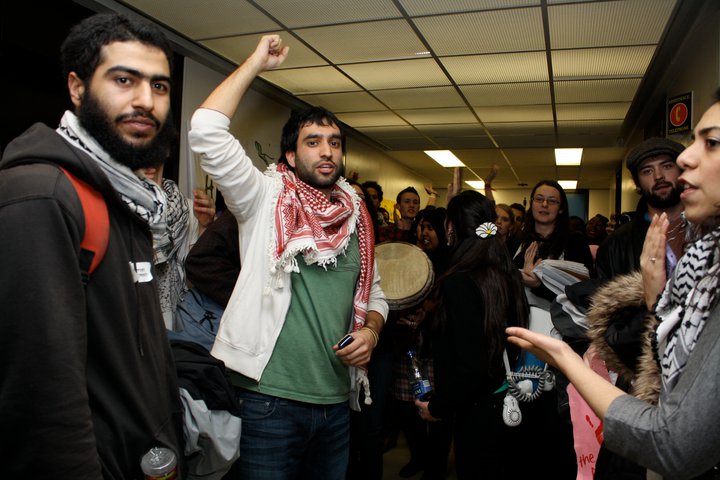In Ottawa, students from Carleton University have spent years building a grassroots movement for social justice in Palestine. Students Against Israeli Apartheid (SAIA) at Carleton University launched a campaign over one year ago calling on the university to divest its pension fund from four companies that are complicit in breaches of international law and human rights violations in the occupied Palestinian territories, followed by the implementation of a Socially Responsible Investment (SRI) policy.
This campaign is inspired by the Palestinian call for boycott, divestment and sanctions against Israel until the state complies with international law. While its inspiration comes from Palestinian civil society, its goals are broad as it seeks to sever the ties between the Carleton pension fund and human rights violations, wherever they occur.
Over two dozen student groups and unions on campus agreed with the spirit of SAIA’s campaign and demonstrated their support by endorsing it. After gaining the support of many of the major student groups, the campaign’s next target was the Carleton University Student Association (CUSA). Bringing a divestment motion to CUSA council was seen as a powerful opportunity to educate and mobilize the student body around the issue of divestment. Consequently, over the past few months SAIA has collected over 2,000 signed student letters addressed to CUSA executives and council members, requesting the divestment campaign recommendations be endorsed in a motion presented by SAIA at the student union council.

The support for divestment culminated in an extraordinary show of student solidarity at the CUSA council meeting on Feb. 17. Over 300 students, alongside faculty and staff, gathered outside of the meeting room ready to speak in support of SAIA’s motion. Although representatives from the university administration unfairly and needlessly limited the number of people allowed in the room to 20 people from each “side” of the issue, supporters who were prevented from attending their own council meeting stayed outside the council room for hours to show their support.
To these people, the message was clear: by speaking up for social justice and human rights in Palestine and demanding their tuition fees not contribute to ongoing oppression, they were on the right side of history. As the rally continued, it became clear through discussions with many other students, that the divestment campaign had resonance beyond Palestine solidarity, as it weaved together calls for institutional accountability and raised into question the public responsibility of universities.
SAIA and its supporters experienced what would be the first of many attempts throughout the night to silence them when a motion drafted just two days before the meeting by some CUSA executives was placed on the agenda ahead of SAIA’s motion, which had been submitted weeks before. The motion, which also called for SRI, was essentially toothless and only referred to human rights violations in an abstract manner, with no specific mention of Palestine or the companies researched by SAIA.
This procedural maneuver seemed to be an attempt to throw half-hearted support behind the growing student demand for SRI while avoiding associating the organization with Palestinian human rights. Some CUSA executives strategically placed their motion first on the agenda and, along with councilors, voted down a request to amend the agenda to allow the SAIA motion, months in the works, as the first item. The strategy of this action became apparent after CUSA’s motion had been debated and SAIA’s motion was deemed to be “redundant” and struck from the agenda, in a cynical display of political and procedural manipulation.
Despite the disheartening actions of timid student politicians, victory was eventually achieved at CUSA council and student voices were heard. The spirit and goals of the SAIA motion were achieved by an amendment to the CUSA motion which added “illegal occupation” in the list of violations from which CUSA opposes profiting. Even this simple statement in solidarity with occupied peoples caused much debate, with some students in the room bizarrely arguing the amendment would “marginalize” them and served to unfairly single out Israel for condemnation.
Other students, however, argued that the struggles of occupied peoples need to be recognized and supported, as these efforts too often go unnoticed, or worse, are silenced. In the end, the CUSA motion, along with the amendment to include “illegal occupation,” was successfully passed. News quickly reached the crowd of supporters, still waiting outside, who erupted in cheers, yelling “victory!” Supporters with tabla drums, banners and chants erupted in the most positive energy I’ve ever seen at Carleton University.
Against numerous attempts to silence them, students made sure their voices were heard and that the demands of the divestment campaign were made loud and clear. In many ways, this campaign is now beyond SAIA; it is owned by over two dozen student groups, unions, faculty and individual students. A deeply moving struggle like this can only grow and open new minds. On Carleton’s campus, this has developed into a powerful student movement for truth, accountability and justice.
Ultimately, the divestment debate at CUSA council was a success. Yet it was just a step along the way to the highest authority at Carleton University: the Board of Governors (BOG). In March, students will be taking the campaign to the BOG to demand that the Pension Fund Committee divests from the four companies targeted by SAIA, and adopts SRI in an open and transparent manner in consultation with the campus community. The message is simple: universities have no business in war profiteering or military occupation.
Students seeking justice in their education must ask their administration where their money is going. There is no better place for students to start than in their campus communities, demanding that their tuition money be invested responsibly. As university campuses tackle the threats of increasing “economic liberalization” and privatization, now more than ever it is time to question corporate social responsibility. Your campus is your first site for resistance!
Yasmine Bennett-AbuAyyash is a Political Science student at Carleton
University and a member of Students Against Israeli Apartheid — Carleton.



